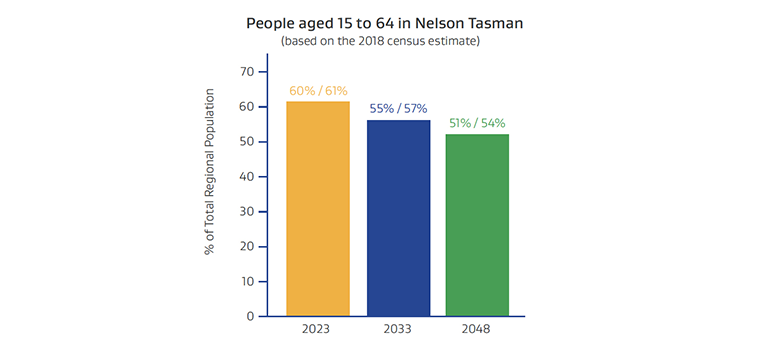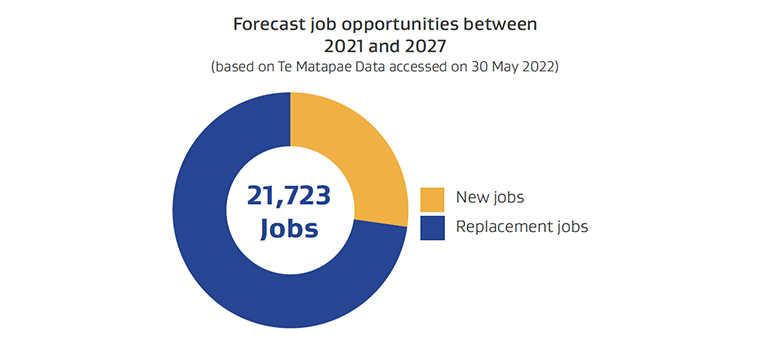Older workers – making the most of unique skills and experience
Nelson Tasman has one of the oldest workforces in New Zealand – currently 42% of all Tasman workers and 41% of all Nelson workers are over age 50.
On this page
Older workers bring unique skills and can improve productivity by passing on their experience. They can provide businesses with skills and knowledge that younger workers cannot. OECD research also shows that older workers improve the productivity of younger co-workers, which improves overall productivity. However, older workers can be subjected to bias and discrimination, and are often disregarded as eligible candidates for a role due to their age.
Promoting an age-Inclusive workforce : Living, learning and earning longer(external link) — OECDLibrary website
Our councils and central government have active regional and national initiatives for older workers. Our work will align with these initiatives, including the Government’s He Mahere Mahi Whakawhiwhi Mahi mō te Hunga Pakeke – Older Workers Employment Action Plan and He Rautaki Whakatupuranga – Nelson City Council’s ‘City for All Ages’ strategy.
Older workers Action Plan [PDF 926KB](external link)
'City for All Ages' strategy [PDF 1.7MB](external link)
Challenges and opportunities
The proportion of people in Nelson Tasman aged 15 to 64 will decline significantly over the next 2 decades.

Text description for graph
The number of replacement job openings (e.g., created when workers retire or leave the workforce for other reasons) is likely to be higher than those created by growth. Infometrics Te Matapae data accessed on 30 May 2022 indicates that of the 21,723 forecast job opportunities in Nelson Tasman between 2021 and 2027, only 5,919 are likely to be new jobs. The remaining 15,804 are forecast to be replacement job openings. Therefore, we need to encourage and support local businesses to employ older workers (aged 50+) in a way that supports their wellbeing, including those who may wish to continue working into their later decades.

Text description of graph
Older workers have skills and knowledge that offer significant benefits for our businesses and wider industries (NRDA business survey 2021). Keeping older workers, developing their skills, introducing automation, and attracting their talent can all help solve the challenge of a shrinking working-age population in our region. In addition, we can specifically support the number of people of working age in Māori and Pasifika communities, who are historically under-represented in higher-skilled jobs. One opportunity to address this inequity in our Nelson Tasman workforce is to provide older Māori and Pasifika access to life-long learning.
While people aged 50 or over make up more than 40% of Nelson Tasman’s workforce, more than half of our businesses do not have specific policies and strategies for those workers (NRDA business survey 2021). Most of our businesses are small and will need support to make changes to meet the needs of older workers, such as job-shaping and job-sizing, among other changes to enable and encourage recruitment and retention of older workers.
Regional actions and national recommendations
The RSLG will lead a central and local government subgroup to collaborate in supporting older workers to participate in our region’s economy, which will include these representatives:
- The Chair of the Older Workers Subgroup is the Ministry of Business, Innovation and Employment (MBIE) RSLG Regional Lead, or their delegate.
- Other members are representatives of Nelson City Council, Tasman District Council, Ministry of Social Development, Chamber of Commerce, Nelson Regional Development Agency, Nelson Marlborough Institute of Technology, and the Regional Public Service Commissioner.
Regional actions we will take in Nelson Tasman
For the next 2-3 years, this Older Workers Subgroup will develop and deliver an implementation plan for the following actions, and report on their progress and impact.
Increase our shared understanding of older workers by:
- identifying and sharing data and insights of the demographic challenges facing our region’s workforce
- sharing information and learning about how to maximise older workers’ contributions to our region.
Collaborate to develop and deliver projects that support employers to attract and retain older workers, including showcasing successful examples.
Support the delivery of the 4 actions allocated to the RSLG in the Nelson City Council’s ‘City for All Ages’ strategy:
- Identifying effective channels to reach older workers with information about work opportunities.
- Working with employers to identify skills shortages for older people looking for jobs and advising on training opportunities that will help match them into appropriate work opportunities.
- Exploring ways to help employers support their older workers, including helping to retrain them and enabling flexible working arrangements.
- Exploring micro-credentials and other types of training to help older workers to reskill and upskill in a way that supports them in their career choices.
Our recommendations for national consideration
We strongly support all 11 actions set out in the national Older Workers Employment Action Plan (OWEAP), and endorse the recommendations in the OWEAP for TEC, regarding funding the following actions:
- Action 1: Research and assess the needs of older workers for training, upskilling, and vocational education, and the barriers to access (including appropriateness and availability).
- Action 3: Actively engage with older workers and make sure they can access information that will help them identify training options, prepare for work, find work, and stay in work.
- Action 4: Review relevant career products to make sure that older workers are visible, and their context reflects the diversity of older workers, is useful and relevant to them, and raises awareness of study and training options.
- Action 10: Improve understanding across industry groupings and sectors of the effects and opportunities of an ageing workforce. We look forward to working with TEC to deliver this action.
Ministry of Social Development: We specifically note and commend the regional research conducted by MSD into the impact of COVID-19 on older jobseekers in the Nelson MSD region. We strongly support that report’s recommendations regarding Advocacy, Services, and Job Seeker Insights, and specifically ask that MSD consider this initiative:
- The RSLG strongly supports the establishment of a Pilot Older Worker Support Programme in the Nelson Tasman region.

